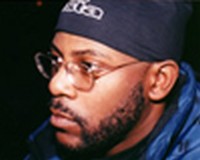DJ Spen interview: A red light, a feelin'
Author: Cyclone
Monday, January 30, 2006

House music may have been overshadowed by electro of late, but DJ Spen is sticking to what he does best. House wit' attitude, soul and funk. Influenced by gospel, R&B and disco, Spen emerged from Baltimore's music underground in the '80s. In 2006 Baltimore house is trendy with Florida's hip hop renegade Diplo, a supporter of regional styles such as Brazilian baile funk. Spen should capitalise, but he's an individual. That's not to say the DJ has no allegiance to Baltimore house, he's just putting his own twist to it. So what exactly is this Baltimore house-
"Geez, Baltimore house is such a wide variety of different things," Spen begins. "The only thing that I could imagine that would give Baltimore house a staple is that most Baltimore house productions have a certain type of an energy behind 'em when it comes to the drum tracks that most other house music doesn't have. So when you're trying to distinguish between Baltimore house and other kinds of house I think that would be the major distinction - that the rhythm tracks are totally different to most other tracks. They're usually a little harder and a little more dancefloor-friendly than your average vocal dance song."
Had Spen not succeeded in music he might have become an English teacher. After all, he graduated from college in Mass Communications. At one stage Spen fancied a career as a cartoonist - he can draw.
The DJ, already doing mix-ups on local radio in his youth, came to prominence as a member of the Basement Boys' stable. A little known fact is that even before joining Basement Boys Spen enjoyed a crossover hit of a kind. Spen was in the Baltimore hip hop group Numarx, whose 1986 Girl You Know It's True was covered by the once infamous and now ignominious Milli Vanilli.
"We were a five-man hip hop group from about 1982 to about '86/'87 and we did a few albums and a few singles, but the biggest of these singles was a song that we did called Girl You Know It's True.
"We recorded it for a record label called Studio Records outta Washington DC and, at the time, the guy who owned the label was trying to find someone overseas to pick us up as a group, but that didn't happen.
"What ended up happening was the record label overseas ended up liking the song more than they liked us as a group and ended up taking the song and getting another producer to do it and he bought in Milli Vanilli - and the rest is history!"
Did Spen generate lots of royalties- "We did pretty well," he says bashfully. Enough to set him up- Spen laughs, "Yeah, we did really well."
As a Basement Boy, Spen debuted with A Feelin'. He forged an identity as a remixer. Spen conceived the Jasper Street Company (JSC) as a group project (they issued the now rare In A Spensane World). However, at the start of the decade Spen split from the Basement fold to develop his own company, MuthaFunkaz Productions. He had to abandon JSC.
"JSC was something that was established during my years at Basement Boys. Being that I left Basement Boys, I had to leave JSC behind because that was tied in to Basement Boys as a company. I am working with some of the singers from JSC but not JSC as a unit like it was before. It wasn't a thing that I wanted to leave behind but, with me moving on and doing things on my own, I figured that it would just be best to leave JSC as well and try and concentrate on some new and different things rather than try and hold onto something that was successful in the past."
Spen has revealed that the catalyst for quitting the Basement Boys was his becoming a father. Regardless, he insists it was amicable. Spen is still working with JSC vocalist Biblical Jones, with whom he visited Australia a couple of years ago. JSC occasionally tour. "All of a sudden after we stopped making records, th Tags

